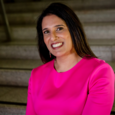Dynamic working helps employees find the balance beam
Between gymnastics every Saturday, swimming practice every Monday, and dance lessons, Sara Walbyoff knows how to keep her dad, Paul, busy. And that's before taking into account the various hospital check-ups and physio appointments the 10-year-old aspiring Paralympian needs to manage her ongoing disability.
Fortunately, Leidos' dynamic working policy allows Paul Walbyoff the flexibility to fit his work as a Quality Assurance Advisor around caring for his daughter. She was born with Currarino Syndrome which is a rare form of Spina Bifida, in which the spinal cord doesn't properly develop.
“In previous jobs, I would have had to use up my annual leave to take her to appointments," he explains. “Here, if I know I'll need to take a few hours off during the morning, I can just build up those hours elsewhere. It's a godsend for us."
Like more than 4,000 other Leidos employees, Paul works remotely. That means he only needs to visit the office for occasional meetings, making it even easier to pop out of work whenever his daughter needs him.
“I can log in at eight in the morning, work through till 10, log off to take her to the appointment and back, then log on again within two hours," he explains. “If I had to go into the office, that would mean spending all my time travelling between home and Bristol, so I'd have to take a whole day's leave."
Though Sara still has some difficulty with lower body function, including asymmetry in her right leg, this hasn't held back her athletic success. Alongside being Welsh champion for disability gymnastics for her age group, she has been selected for the Welsh disability sports performance pathway, with the hope of making it to the 2028 Paralympics in Los Angeles.
Still, as her father describes, getting to this point was a difficult battle. For the first five years of her life, Sara wore a cast from four months old, for several months, from ankle to thigh, then wore special boots and bars, with the aim of straightening out her right foot (called the Ponseti Method), followed by a series of operations for which she and Paul had to make several trips from South Wales to Great Ormond Street hospital in London. The Walbyoffs are passionate about helping prevent other families from having to go through the same experience.
“There are supplements a woman can take when she's pregnant, such as folic acid, that can prevent development issues, like Spina Bifida," Paul explains. “The problem is that the spinal cord starts to develop within the first six weeks, so by the time she's realised she's pregnant, it's often too late. It’s recommended to take folic acid supplements at least 12 weeks before conception."
To that end, Paul and his family have been working with Spina Bifida charity, Shine, to campaign for flour to be supplemented with folic acid―as it is in 80 other countries worldwide. Last September, the government announced that this would be made mandatory across the UK, a move that could reduce the occurrence of conditions like Sara's by as much as 20%.
The Walbyoffs continue to fundraise for Shine, from running marathons to climbing mountains. And last Christmas, Paul helped facilitate a donation from Leidos to the charity.
For Paul, that donation is just one indicator of how supported he's felt at Leidos, both by his team members and the company more broadly, when it comes to managing his responsibilities as a caregiver alongside his work.
“The understanding, flexibility, and care Leidos provides as an employer is really good," he says. “You feel appreciated as an individual, and you feel you can work to the best of your ability as a result."





